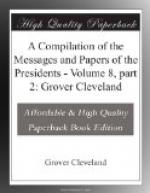It gives me pleasure to report a decided improvement in the financial condition of the Post-Office Department as compared with several preceding years. The receipts for the fiscal year 1861 amounted to $8,349,296.40, which embraced the revenue from all the States of the Union for three quarters of that year. Notwithstanding the cessation of revenue from the so-called seceded States during the last fiscal year, the increase of the correspondence of the loyal States has been sufficient to produce a revenue during the same year of $8,299,820.90, being only $50,000 less than was derived from all the States of the Union during the previous year. The expenditures show a still more favorable result. The amount expended in 1861 was $13,606,759.11. For the last year the amount has been reduced to $11,125,364.13, showing a decrease of about $2,481,000 in the expenditures as compared with the preceding year, and about $3,750,000 as compared with the fiscal year 1860. The deficiency in the Department for the previous year was $4,551,966.98. For the last fiscal year it was reduced to $2,112,814.57. These favorable results are in part owing to the cessation of mail service in the insurrectionary States and in part to a careful review of all expenditures in that Department in the interest of economy. The efficiency of the postal service, it is believed, has also been much improved. The Postmaster-General has also opened a correspondence through the Department of State with foreign governments proposing a convention of postal representatives for the purpose of simplifying the rates of foreign postage and to expedite the foreign mails. This proposition, equally important to our adopted citizens and to the commercial interests of this country, has been favorably entertained and agreed to by all the governments from whom replies have been received.
I ask the attention of Congress to the suggestions of the Postmaster-General in his report respecting the further legislation required, in his opinion, for the benefit of the postal service.
The Secretary of the Interior reports as follows in regard to the public lands:
The public lands have ceased to be a source of revenue. From the 1st July, 1861, to the 30th September, 1862, the entire cash receipts from the sale of lands were $137,476.26—a sum much less than the expenses of our land system during the same period. The homestead law, which will take effect on the 1st of January next, offers such inducements to settlers that sales for cash can not be expected to an extent sufficient to meet the expenses of the General Land Office and the cost of surveying and bringing the land into market.
The discrepancy between the sum here stated as arising from the sales of the public lands and the sum derived from the same source as reported from the Treasury Department arises, as I understand, from the fact that the periods of time, though apparently, were not really coincident at the beginning point, the Treasury report including a considerable sum now which had previously been reported from the Interior, sufficiently large to greatly overreach the sum derived from the three months now reported upon by the Interior and not by the Treasury.




